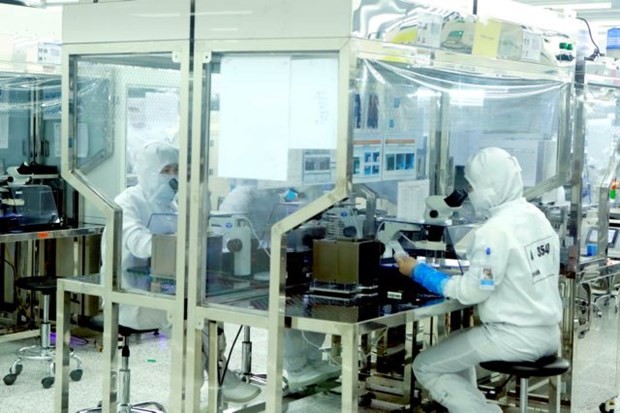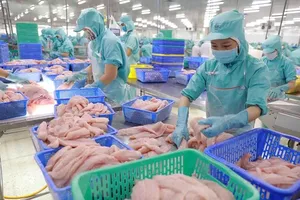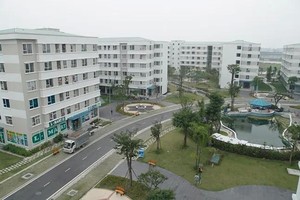 Production activities at Optrontec Vina Company in Vinh Phuc province's Binh Xuyen Industrial Park. (Photo: VNA)
Production activities at Optrontec Vina Company in Vinh Phuc province's Binh Xuyen Industrial Park. (Photo: VNA)
The two centers, which received in-principle approval from MoIT, will help industrial producers and enterprises support industries, boost innovation and technology transfer, improve productivity and quality, increase added value in their products, and take part in global supply chains.
They will also target improving science and technology capacity for enterprises in supporting industries and those in processing and manufacturing, strengthen domestic and international cooperation in research and development and facilitate the application of science and technology, besides enhancing the public-private partnership mechanism in technological innovation, research and development projects.
The development and operation of such centers will help create key economic zones to support businesses in promoting innovation, improving production techniques and trade connections, and creating added value for the industry.
Initially, these centers had implemented several activities to facilitate enterprises in supporting industries in some localities, including bettering links among firms in the automobile industry, electronics, mechanical engineering, textiles and footwear and cooperating with multinational corporations available in Vietnam such as Toyota, Mitsubishi and Canon to find suitable local suppliers to participate in the value chain of these corporations.
Truong Thanh Hoai, head of the agency, told congthuong that Vietnamese small and medium-sized enterprises needed support from the State until they could compete in the global market and become a reliable production partner for the worldwide production chain. For this, support innovation, production management systems, access to preferential credit sources, new technologies and high-quality human resources were essential.
Four month IIP surges
In April, Vietnam’s index for industrial production (IIP) increased 9.4 percent year-on-year and 2 percent month-on-month, thanks to good control of COVID-19 and enterprises taking the bigger initiative in labourers and business and production plans for expansion, the General Statistics Office has said.
During the month, the manufacturing and processing sector, which created 80 percent of industrial growth, expanded 11.3 percent year-on-year, much higher than 5.8 percent and 9.6 percent seen in 2018 and 2019 - two years before the pandemic.
According to GSO, the IIP also saw a positive increase of 7.5 percent on year in the first four months of this year.
The processing and manufacturing industry had a yearly IIP rise of 8.3 percent. Meanwhile, the IIP growth of the electricity production and distribution industry stood at 6.6 percent, and the mining industry and water supply and waste and wastewater treatment reached 2.6 percent and 1.1 percent, respectively.
Key industries that recorded high increases in four months include clothing (up 20.1 percent); electrical equipment (19.2 percent); machinery (13.2 percent); metal production (12.8 percent); pharmaceutical (11 percent); electronics, computers and optical products (10 percent); and paper production (9.7 percent).
On the contrary, several industries saw a decline in industrial production, such as rubber and plastic products, by 13 percent; repair, maintenance and installation of machinery and equipment (11.5 percent); coke and refined petroleum products (8.3 percent); and crude oil and natural gas (2 percent).
Among industrial products with strong IIP increases in the period were telephone components with 21.5 percent; fabrics made from natural fibres (13.5 percent); aluminium (13 percent); automobiles (12 percent); processed seafood (11.3 percent); fresh milk; (10 percent); and rolled steel (9.6 percent).
Some products decreased compared to the previous year, including televisions (19 percent); mobile phones (10 percent); gasoline and oil (9.7 percent); aquatic feed (8.4 percent); crude steel (5.8 percent); and paint (2.1 percent).
The GSO also outlined the provinces which saw the highest IIP growth from January to April, including Ha Giang (33.2 percent); Bac Giang (32.1 percent); Kon Tum (24.3 percent); Lai Chau (24.2 percent); Binh Phuoc (20.6 percent); and Hai Duong (20.4 percent).
As of April 1, the number of employees working in industrial enterprises rose 1.3 percent month-on-month and 4 percent year-on-year.
Laborers in State-owned enterprises decreased 4 percent year-on-year, while those in non-State firms slumped 2.4 percent, and foreign-invested businesses increased 5.3 percent.
By industry, the number of employees working in mining enterprises decreased 2 percent year-on-year; those in processing and manufacturing firms and water supply and waste and wastewater treatment surged by 4.3 percent and 2 percent, respectively.
They will also target improving science and technology capacity for enterprises in supporting industries and those in processing and manufacturing, strengthen domestic and international cooperation in research and development and facilitate the application of science and technology, besides enhancing the public-private partnership mechanism in technological innovation, research and development projects.
The development and operation of such centers will help create key economic zones to support businesses in promoting innovation, improving production techniques and trade connections, and creating added value for the industry.
Initially, these centers had implemented several activities to facilitate enterprises in supporting industries in some localities, including bettering links among firms in the automobile industry, electronics, mechanical engineering, textiles and footwear and cooperating with multinational corporations available in Vietnam such as Toyota, Mitsubishi and Canon to find suitable local suppliers to participate in the value chain of these corporations.
Truong Thanh Hoai, head of the agency, told congthuong that Vietnamese small and medium-sized enterprises needed support from the State until they could compete in the global market and become a reliable production partner for the worldwide production chain. For this, support innovation, production management systems, access to preferential credit sources, new technologies and high-quality human resources were essential.
Four month IIP surges
In April, Vietnam’s index for industrial production (IIP) increased 9.4 percent year-on-year and 2 percent month-on-month, thanks to good control of COVID-19 and enterprises taking the bigger initiative in labourers and business and production plans for expansion, the General Statistics Office has said.
During the month, the manufacturing and processing sector, which created 80 percent of industrial growth, expanded 11.3 percent year-on-year, much higher than 5.8 percent and 9.6 percent seen in 2018 and 2019 - two years before the pandemic.
According to GSO, the IIP also saw a positive increase of 7.5 percent on year in the first four months of this year.
The processing and manufacturing industry had a yearly IIP rise of 8.3 percent. Meanwhile, the IIP growth of the electricity production and distribution industry stood at 6.6 percent, and the mining industry and water supply and waste and wastewater treatment reached 2.6 percent and 1.1 percent, respectively.
Key industries that recorded high increases in four months include clothing (up 20.1 percent); electrical equipment (19.2 percent); machinery (13.2 percent); metal production (12.8 percent); pharmaceutical (11 percent); electronics, computers and optical products (10 percent); and paper production (9.7 percent).
On the contrary, several industries saw a decline in industrial production, such as rubber and plastic products, by 13 percent; repair, maintenance and installation of machinery and equipment (11.5 percent); coke and refined petroleum products (8.3 percent); and crude oil and natural gas (2 percent).
Among industrial products with strong IIP increases in the period were telephone components with 21.5 percent; fabrics made from natural fibres (13.5 percent); aluminium (13 percent); automobiles (12 percent); processed seafood (11.3 percent); fresh milk; (10 percent); and rolled steel (9.6 percent).
Some products decreased compared to the previous year, including televisions (19 percent); mobile phones (10 percent); gasoline and oil (9.7 percent); aquatic feed (8.4 percent); crude steel (5.8 percent); and paint (2.1 percent).
The GSO also outlined the provinces which saw the highest IIP growth from January to April, including Ha Giang (33.2 percent); Bac Giang (32.1 percent); Kon Tum (24.3 percent); Lai Chau (24.2 percent); Binh Phuoc (20.6 percent); and Hai Duong (20.4 percent).
As of April 1, the number of employees working in industrial enterprises rose 1.3 percent month-on-month and 4 percent year-on-year.
Laborers in State-owned enterprises decreased 4 percent year-on-year, while those in non-State firms slumped 2.4 percent, and foreign-invested businesses increased 5.3 percent.
By industry, the number of employees working in mining enterprises decreased 2 percent year-on-year; those in processing and manufacturing firms and water supply and waste and wastewater treatment surged by 4.3 percent and 2 percent, respectively.
























